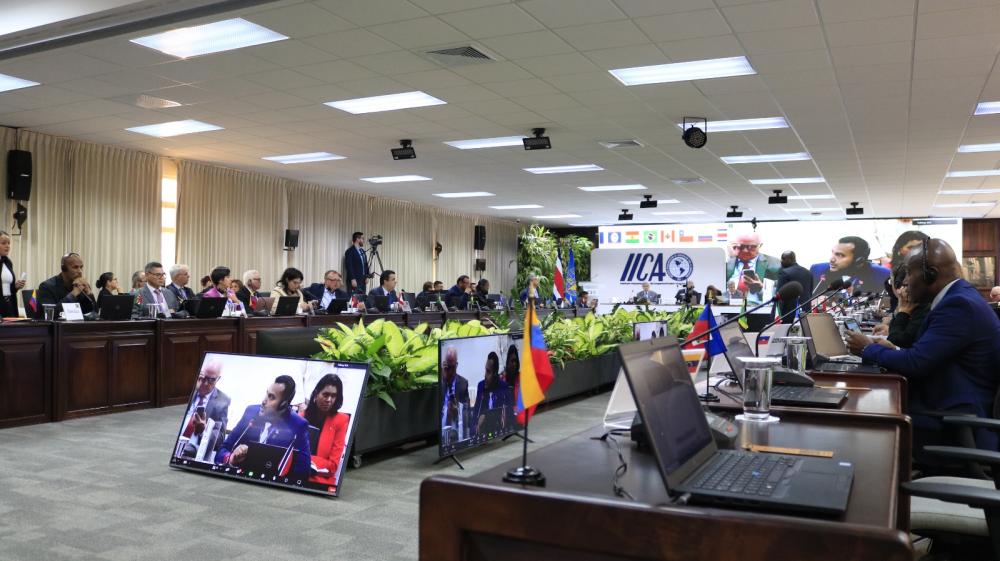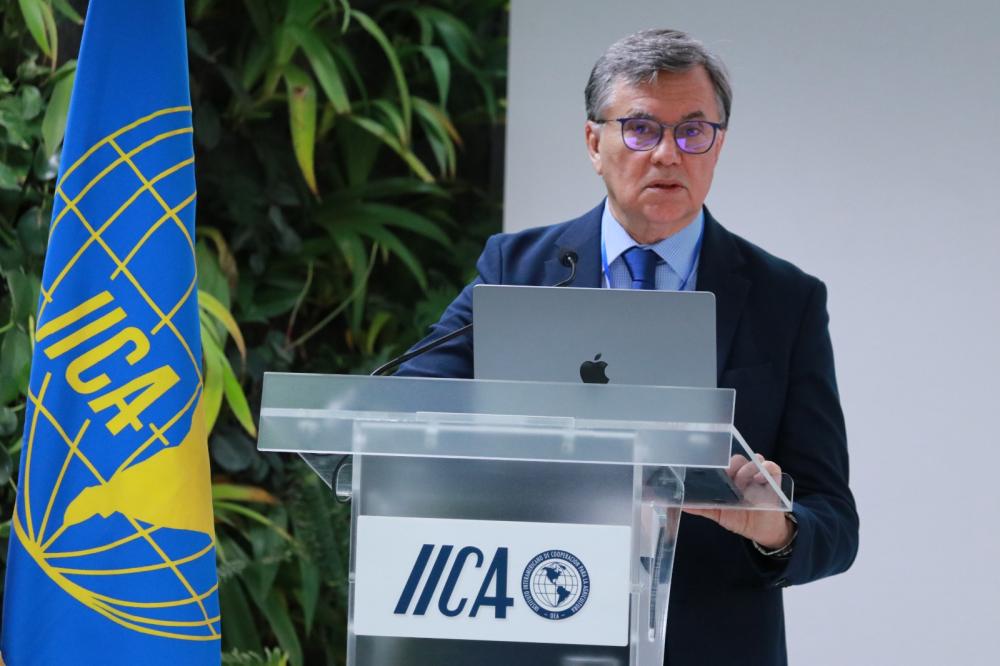The conference sought to provide a forum to facilitate discussion, drive collective action and reinforce the region’s role as a guarantor of global food security and environmental sustainability, in a world that is currently grappling with converging crises and uncertainty.

San Jose, 5 October 2023 (IICA) – The ministers of Agriculture of the Americas, who were meeting in Costa Rica, expressed their unequivocal support for the Hemispheric Partnership for Food Security and Sustainable Development, spearheaded by the Inter-American Institute for Cooperation on Agriculture (IICA), declaring that the hemisphere’s agriculture sector should play a leading role and is prepared to continue feeding the world, even as it protects the natural environment.
The Conference of Ministers of Agriculture of the Americas 2023, which took place over three working days at IICA Headquarters, demonstrated the solid consensus that countries of the region have been building in the face of immense global challenges.
The countries agreed that moving to establish a hemispheric partnership is a crucial step in consolidating and systematizing the collective efforts of the governments and civil societies of the region to enhance food security and sustainable development.
The ministers and officials of the 34 Member States in attendance requested that the Director General of the Institute, Manuel Otero, expand and intensify the necessary actions to consolidate this partnership, based on the belief that the hemisphere’s agriculture sector plays a strategic role in tackling current global challenges.
The conference sought to provide a forum to facilitate discussion, drive collective action and reinforce the region’s role as a guarantor of global food security and environmental sustainability, in a world that is currently grappling with converging crises and uncertainty.
The Presidents of Panama and Guyana, Laurentino Cortizo and Mohamed Irfaan Ali, were present at the opening of the conference at IICA Headquarters, which brought together agricultural ministers and officials from the Institute’s 34 Member States, not to mention a Nobel Prize laureate, a World Food Prize recipient and the CEO of the World Food Prize Foundation, among other invited guests. The event also featured a video message by the Minister of Climate Change and the Environment of the United Arab Emirates (UAE), host country of the upcoming COP28 meeting.
The approved resolutions and the discussion forums reflected the consensus among the participants that the urgency and nature of the challenges affecting agriculture demand that action be taken, on the basis of four underlying strategic principles of IICA’s proposed hemispheric partnership: agrifood systems need strengthening but are not failed systems; agriculture should be considered as part of the solution to the current challenges, given its importance to the economy and its ability to mitigate climate change; science and technology should guide the transformations; and farmers are key players, as they are the ones most able to more sustainably manage natural and production resources.
The hemispheric partnership is the outcome of a process that is closely linked to IICA’s mission to provide technical cooperation of the highest quality, in order to drive the agricultural development and rural well-being of the region. This process was strengthened in 2021, when the Institute promoted discussions that led to an unprecedented hemispheric consensus ahead of the United Nations Food Systems Summit. The Americas was the only region that presented a unified position at the Summit, embodied in a document with sixteen messages on the irreplaceable role of agriculture in food production and the leading role of farmers and agrifood workers.
The Director General of IICA, Manuel Otero, expressed his satisfaction at the show of support for IICA’s actions, which he felt demonstrated the relevance that IICA has gained as an organization that builds bridges between the region’s various agricultural stakeholders and that is a promotor of collective action.
“The consensus reached at the Conference reflects the spirit of transformation of the agriculture sector and we must give it direction and translate it into action, to pave the way for a solid hemispheric partnership for food security and sustainable development. This is the only way that we will contribute to reducing poverty and food insecurity and lay the foundation for a more sustainable agriculture sector”, he insisted.
“We can successfully tackle the challenges—he added—working together, in solidarity, understanding that unity is strength and that no one should be left out and no one should be left behind”.
Brazil, venue of the next Conference
The Conference, which is held every two years, also includes a meeting of the Inter-American Board of Agriculture (IABA), IICA’s highest governing body, composed of the 34 ministers of Agriculture of the hemisphere.
The countries decided by vote to hold the next Conference in Brazil, in the second half of 2025. That same year, the city of Belem do Pará, Brazil, will host COP30, the thirtieth edition of the United Nations Climate Change Conference, in which agriculture of the Americas has been amplifying its voice with the support of IICA.
As it did at COP 27 in Egypt, IICA will install a pavilion at COP28 in Dubai, which ministers of the Americas and private sector representatives will be encouraged to attend, as stated in another of the Conference’s resolutions. The Home of Sustainable Agriculture of the Americas pavilion at COP28, the world’s premier forum for environmental discussions, will enable the sector to showcase its progress with respect to climate change mitigation and adaptation.

Solutions to challenges
During the Conference forums, participants proposed solutions to the most pressing challenges facing the sector, at a time when food security is at the top of the global agenda.
Among the topics discussed were social inclusion and family farming, climate change mitigation and adaptation, the water crisis, digital technology use, funding for science and research in agriculture and international trade.
Michael Kremer, 2019 Nobel Prize laureate for Economics, emphasized the need for technological development, which can improve the quality of life of family farmers – the weakest link in the agriculture sector – for a low cost. Kremer led a forum that explored ways to bridge gaps in innovation, science and technology, with special emphasis on digital agriculture and the bioeconomy. Participants underscored the need for all rural areas of Latin America and the Caribbean to have access to digital technical assistance.
In a forum on climate funding and opportunities for agriculture, led by scientist Rattan Lal, 2020 World Food Prize recipient, there was agreement on the need to move from words to action with respect to soil health. Lal urged the ministers and officials to advocate for the passage of laws to protect soil in their countries, in light of the strategic role of this natural resource for agriculture, environmental sustainability and global food security.
Another discussion focused on the importance of cooperativism as a key tool to enhance the inclusion of family farmers, women and youth, as well as foster rural retention. Participants also underscored the urgent need to foster a new generation of differentiated public policies for family farming that recognize the diversity of the peasant and indigenous communities in the Americas. It was also agreed that measures should be generated to provide small-scale farmers with greater access to production resources, such as land, capital and work tools.
The ministers in attendance also discussed agricultural health and agreed on the need for an improved assessment that would enhance the harmonization of health policies in the hemisphere. They also noted that work must be undertaken to update the mapping of pests and diseases that affect agricultural production and individuals, under a One Health approach.
There was also consensus on the importance of strengthening international trade, a pillar for global food security, by consolidating a network of agricultural negotiators within the framework of the World Trade Organization (WTO). The countries also agreed to intensify joint efforts to address the emergence of rules, regulations and actions that threaten to restrict the agrifood trade of countries in the region.
More information:
Institutional Communication Division.
comunicacion.institucional@iica.int











